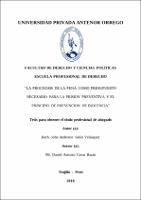Mostrar el registro sencillo del ítem
La prognosis de la pena, como presupuesto necesario para la prisión preventiva y el principio de presunción de inocencia
| dc.contributor.advisor | Cerna Bazan, Daniel Antonio | |
| dc.contributor.author | Salón Velásquez, John Anderson | |
| dc.creator | Salón Velásquez, John Anderson | |
| dc.date.accessioned | 2018-04-17T14:17:12Z | |
| dc.date.available | 2018-04-17T14:17:12Z | |
| dc.date.issued | 2018 | |
| dc.identifier.uri | https://hdl.handle.net/20.500.12759/4041 | |
| dc.description.abstract | La presente investigación busca determinar, de qué manera el presupuesto material de prognosis de pena, regulado en el literal b del artículo 268 del Código Procesal Penal, resulta incompatible con el principio de Presunción de Inocencia, establecido en el proceso penal de modelo acusatorio contradictorio. Esta investigación es descriptiva y para su desarrollo se utilizaron los métodos lógicos (inductivo, deductivo, análisis y síntesis) y jurídicos (exegético). Los materiales empleados fueron, el Código Procesal Penal Peruano D.L. 957, la casación 626– Moquegua, el Informe sobre el uso de la prisión preventiva en las Américas, así como la doctrina que desarrolla el tema materia de estudio. Se llegó a la conclusión, que el presupuesto material de prognosis de pena, como está regulado en el literal b del artículo 268 el Código Procesal Penal, si es interpretado restrictivamente, vulnera el principio de presunción de inocencia, ya que implica que existirá una sanción condenatoria superior a 4 años, en una etapa del proceso donde no corresponde y mediante una medida destinada a asegurar los fines del proceso y no a condenar. | es_PE |
| dc.description.abstract | The present investigation seeks to determine, how the material budget of prognosis punishment, regulated in the literal b of article 268 of the Code of Criminal Procedure, it is incompatible with the principle of presumption of innocence established in the criminal process of contradictory accusatory model. This investigation is descriptive and for their develpment were used the logical methods (inductive, deductive, analysis and synthesis) and legal (Exegitical). The materials used were, the Code of Criminal Procedureof Perú D.L. 957, the cassation 626- 2013 Moquegua, the report on the use of pretrial detention in the americas,as well as the doctrine that develops the subject matter of study. The conclusion was reached, that the material budget of punishment prognosis, how is it regulated in the literal b of article 268 of the Code of Criminal Procedure, if it is interpreted restrictive, violates the principle of presumption of innocence since it implies that there will be a condemnatory sanction superior to 4 years, in a stage of the process where it does not correspond and by means of a measure designed to ensure the ends of the process and not to condemn. | en_US |
| dc.description.uri | Tesis | es_PE |
| dc.format | application/pdf | es_PE |
| dc.language.iso | spa | es_PE |
| dc.publisher | Universidad Privada Antenor Orrego | es_PE |
| dc.relation.ispartofseries | T_DERE_394 | |
| dc.rights | info:eu-repo/semantics/openAccess | es_PE |
| dc.rights.uri | https://creativecommons.org/licenses/by/4.0/ | es_PE |
| dc.source | Universidad Privada Antenor Orrego | es_PE |
| dc.source | Repositorio Institucional - UPAO | es_PE |
| dc.subject | Prognosis de pena | es_PE |
| dc.subject | Presunción de inocencia | es_PE |
| dc.title | La prognosis de la pena, como presupuesto necesario para la prisión preventiva y el principio de presunción de inocencia | es_PE |
| dc.type | info:eu-repo/semantics/bachelorThesis | es_PE |
| thesis.degree.level | Título Profesional | es_PE |
| thesis.degree.grantor | Universidad Privada Antenor Orrego. Facultad de Derecho y Ciencias Politicas | es_PE |
| thesis.degree.name | Abogado | es_PE |
| thesis.degree.discipline | Derecho | es_PE |
| dc.publisher.country | PE | es_PE |
Ficheros en el ítem
Este ítem aparece en la(s) siguiente(s) colección(es)
-
Derecho [453]


